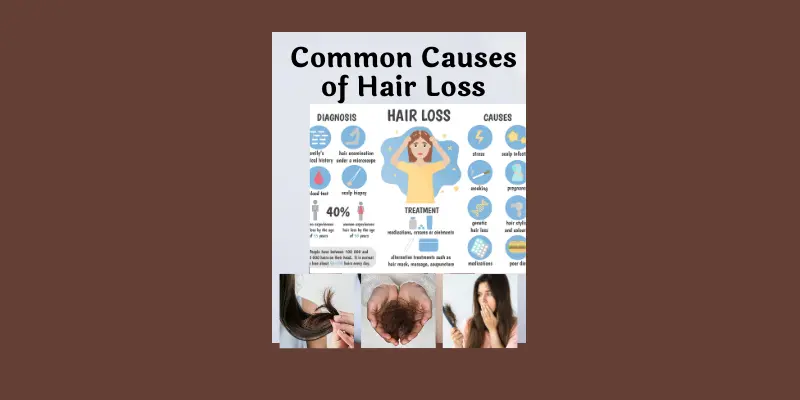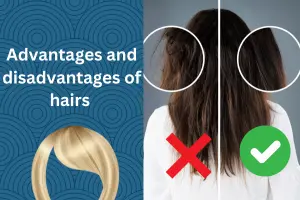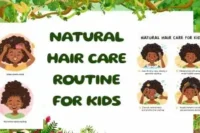Hair Loss: Causes, Prevention, and Effective Home Treatments
Published: 28 Oct 2024
Hair loss affects a significant portion of the population, with around 40% of individuals experiencing it at some point in their lives. It’s not just a cosmetic concern; it can impact self-esteem and overall well-being. A typical person sheds about 50 to 100 hairs daily, but excessive loss may indicate underlying issues.
Common Causes of Hair Loss
Hair loss can be triggered by a range of factors, including genetics, stress, poor diet, and improper grooming habits. The image below highlights the most common causes men and women face—some of which can be managed with better hair care and the use of the Best Hair Brushes to minimize breakage and scalp stress.

Now that you have a clear picture of the main causes, let’s dive deeper into each one and explore tips to reduce hair loss and improve scalp health.
Genetic Factors
Androgenetic alopecia, commonly known as pattern baldness, is hereditary and affects both men and women.
Hormonal Imbalances
Conditions like pregnancy, menopause, and thyroid disorders can lead to temporary or permanent hair loss due to hormonal fluctuations.
Nutritional Deficiencies
Lack of essential nutrients such as iron, vitamin D, and biotin can weaken hair follicles, leading to hair loss.
Stress and Anxiety
High stress levels can disrupt the hair growth cycle, causing hair to fall out prematurely.
Improper Hair Care
Overuse of heat styling tools, chemical treatments, and tight hairstyles can damage hair and lead to breakage.
Medical Conditions
Diseases like alopecia areata or scalp infections can cause significant hair loss.
Preventive Measures for Hair Loss
Preventing hair loss starts with a healthy scalp, balanced nutrition, and gentle hair care practices. Using the right Hair Brushes can also reduce breakage and minimize stress on the roots.
Balanced Diet
Consume a diet rich in vitamins, minerals, and proteins. Include vegetables, eggs, nuts, and fish to nourish hair follicles.
Gentle Hair Care
Avoid tight hairstyles and minimize the use of heat styling tools. Use sulfate-free and paraben-free hair products to reduce scalp irritation.
Stress Management
Engage in activities like yoga, meditation, or regular exercise to manage stress levels effectively.
Effective Home Remedies
Natural home remedies can offer gentle yet effective solutions for various hair concerns. The image below highlights proven remedies that, when combined with proper techniques, Hair Brushes, and knowledge of how to make hair masks at home, can boost hair health naturally.

Now that you’ve seen these powerful DIY remedies, let’s explore how each one works and how to apply them correctly for the best results at home.
Aloe Vera
Apply fresh aloe vera gel to the scalp, leave it for 30 minutes, and rinse. It helps reduce inflammation and unblock hair follicles.
Coconut Oil
Massage warm coconut oil into the scalp and hair, leave it for an hour, and wash it off. It prevents protein loss and strengthens hair.
Onion Juice
Apply fresh onion juice to the scalp, leave it for 15-20 minutes, and rinse thoroughly. It boosts collagen production, promoting hair growth.
Green Tea
Rinse hair with cooled green tea after shampooing. Its antioxidants help reduce hair loss and stimulate growth.
Rosemary Oil
Apply rosemary oil by mixing a few drops with a carrier oil, massaging it into the scalp, leaving it overnight, and washing it out in the morning. This method improves blood circulation and promotes hair growth.
When to Consult a Professional
If you notice sudden or excessive hair loss, bald patches, or scalp issues, consult a dermatologist.

They can diagnose underlying conditions and recommend appropriate treatments.
Conclusion
Hair loss can be frustrating, but it’s often manageable with the right care and awareness. Whether it’s stress, diet, genetics, or hair habits causing the problem, understanding the root cause is the first step toward recovery. Simple lifestyle changes, gentle hair care, and natural treatments can make a real difference. And when in doubt, always consult a professional. Healthy hair starts with a healthy routine. Your scalp will thank you!
FAQs
The most widespread type of hair loss is androgenetic alopecia, also known as pattern baldness. It affects both men and women, though it often presents differently: men typically develop a receding hairline and crown thinning, while women usually notice diffuse thinning on the top of the scalp. This condition is largely influenced by genetics and hormone sensitivity. Because it is progressive, early treatment can help slow or manage it.
Whether hair loss can be reversed depends on its cause. If it’s due to stress, poor diet, or certain medications, hair often regrows after addressing the underlying issue. However, genetic hair loss is much harder to reverse and usually requires medical treatment like minoxidil or finasteride. Consistent care, proper nutrition, and reducing stress can make a big difference in recovery.
Your diet plays a crucial role in maintaining healthy hair growth. Nutrients such as biotin, iron, vitamin D, zinc, and protein are essential for strong strands. Deficiencies in these nutrients can lead to hair thinning, breakage, or slower growth. A well-balanced diet rich in whole foods, lean proteins, fruits, and vegetables helps nourish the scalp and follicles.
Home remedies may not completely cure hair loss, but they can support scalp and hair health. Ingredients like aloe vera, rosemary oil, and coconut oil are known for their soothing, moisturizing, and stimulating properties. While some people notice thicker, healthier hair, results can vary widely. They work best when combined with a proper diet and a gentle hair care routine.
Washing your hair every day isn’t inherently harmful if you use a mild, sulfate-free shampoo. However, daily washing can strip away natural oils, especially for curly or dry hair types, leading to dryness and breakage. If your scalp is oily, washing more often may help, but balance is key. Using lukewarm water instead of hot water also protects your hair’s health.
Yes, stress can directly affect your hair growth cycle. Conditions like telogen effluvium occur when stress pushes large numbers of hair follicles into a resting phase, leading to shedding weeks later. Chronic stress can worsen thinning and delay regrowth. Practicing relaxation techniques such as yoga, meditation, and proper sleep can help restore balance.
There are several effective treatments for hair loss. FDA-approved options include minoxidil (a topical solution) and finasteride (an oral medication), which can slow or reverse thinning in some people. More advanced solutions include PRP therapy (platelet-rich plasma), low-level laser therapy, and hair transplants. Consulting with a dermatologist can help determine the best option for your needs.
If you notice sudden shedding, bald patches, or significant thinning, it’s best to see a doctor or dermatologist. These symptoms may point to underlying health issues like thyroid imbalances, autoimmune conditions, or severe deficiencies. Early diagnosis and treatment improve the chances of regrowth and help prevent permanent damage to the follicles.
Yes, hormones have a big impact on hair growth and loss. Pregnancy, menopause, or conditions like thyroid disorders can trigger hair shedding or thinning. In many cases, this type of loss is temporary and may reverse once hormone levels stabilize. Proper medical care, along with a balanced diet, can help reduce the impact of these changes.
Healthy lifestyle habits can protect your hair and reduce shedding. Eating a nutrient-rich diet, staying hydrated, and managing stress levels all support stronger strands. Avoiding harsh chemical treatments, excessive heat styling, and tight hairstyles helps preserve hair health. Regular scalp care and gentle products go a long way in preventing unnecessary hair loss.

- Be Respectful
- Stay Relevant
- Stay Positive
- True Feedback
- Encourage Discussion
- Avoid Spamming
- No Fake News
- Don't Copy-Paste
- No Personal Attacks

- Be Respectful
- Stay Relevant
- Stay Positive
- True Feedback
- Encourage Discussion
- Avoid Spamming
- No Fake News
- Don't Copy-Paste
- No Personal Attacks





